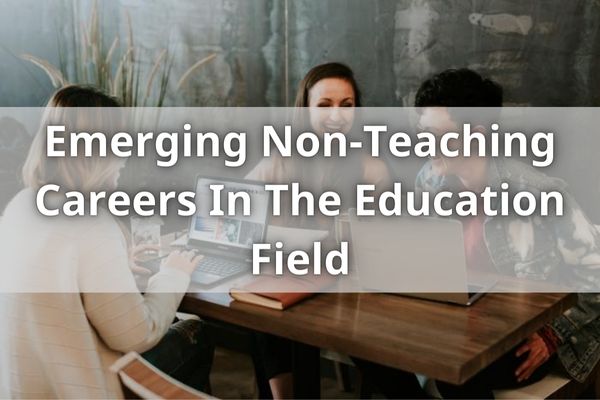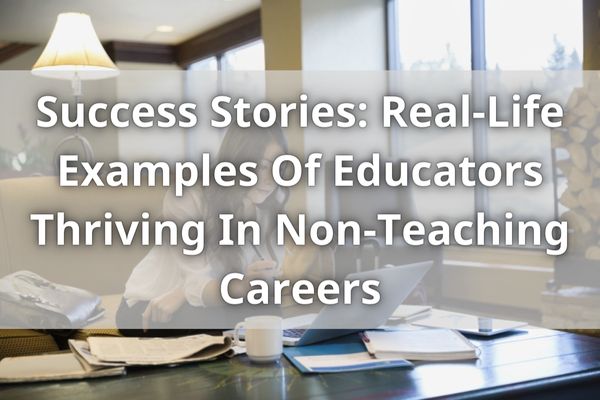Masters Education Non Teaching Careers: Beyond The Classroom
Students who pursue a master’s degree have the chance to concentrate in a particular field of study, expanding their knowledge and developing their talents. This can result in a lucrative teaching career for many persons with a master’s degree. What about individuals who choose not to become teachers?
Don’t worry; there are plenty of Masters Education Non Teaching Careers! We’ll examine some of these choices in-depth in this piece and consider why postgraduate applicants find them to be so alluring.
The Value Of A Master’s In Education Degree Beyond The Classroom
Having a Master’s in Education can open up countless doors for individuals looking to explore career opportunities outside of the classroom. The versatile skill set acquired through an education degree is valued across many industries, making graduates with this type of qualification highly sought after.
From businesses seeking qualified professionals to fill positions in Human Resources or Training and Development roles to NGOs wanting experienced Project Managers, an education degree provides its holders with numerous pathways they may not have considered previously. In addition, as educational programs become increasingly globalized, having a master’s in education opens more possibilities than ever before.
Those with advanced degrees in education have traditionally been employed primarily as teachers in nations like China and India, but there is increasingly acknowledgment that these people have unique talents that can be used in other fields.
As a result, people who can demonstrate their knowledge and competence in the subject on a worldwide level will stand out as particularly appealing to employers everywhere.
Top Non-Teaching Careers For Master’s In Education Graduates
An education master’s degree can lead to a range of options outside of conventional pedagogy in addition to teaching in the classroom. This section will explore five non-teaching careers that are particularly attractive for those with an advanced degree in this field.
- Education consultants advise schools and other organizations on how best to improve their educational programs.
- Instructional designers create instructional materials such as training manuals, online learning modules, or multimedia content.
- Curriculum developers design lesson plans and assessments based on given standards or topics of instruction.
- Education policy analysts conduct research to inform policy decisions around public education while corporate trainers provide workplace skills training and support employee development initiatives.
All these positions require knowledge of educational theory and practice, which makes them ideal choices for those with a graduate degree in education. Those interested in pursuing any of these career paths should be prepared to demonstrate expertise in the field through certification courses or additional coursework beyond their master’s program requirements.
Additionally, networking and internships may be beneficial when it comes to gaining experience and making connections within the industry that could lead to job offers down the road.
With hard work and dedication, there is no limit to what someone with an advanced degree in education can achieve professionally outside the classroom walls!
Emerging Non-Teaching Careers In The Education Field

The need for professionals with advanced degrees and specific skill sets is increasing as the education sector develops. Graduates with a master’s in education have the chance to pursue important and satisfying employment outside of teaching.
From technology start-up founders to social-emotional learning specialists, these emerging career paths offer a unique combination of creativity and problem solving that can make a real difference in our educational system.
For those interested in using their knowledge of data science for good, becoming an educational data analyst could be the perfect fit. By leveraging data collected from students, teachers, and administrators alike, analysts help inform policy decisions that improve student outcomes.
Similarly, diversity, equity, and inclusion officers play an important role in creating safe spaces where all students feel welcome and accepted. Education content creators also provide valuable resources by producing engaging material on platforms such as YouTube or podcasts that can reach broader audiences than traditional teaching settings allow.
Finally, online learning platform managers are essential for maintaining high standards throughout virtual classrooms while keeping up with current trends in digital pedagogy.
The possibilities within the field of education are endless – no matter what path you choose after getting your masters degree, you’ll be making a positive contribution to society!
Additional Non-Teaching Careers To Consider
In addition to the previously mentioned non-teaching careers for those with a master’s degree in education, there are several other options.
For instance, an educational technology specialist leverages their expertise and knowledge of educational trends to help support instructional initiatives; they may also be involved in the development or implementation of digital learning materials.
A museum educator is another option, combining both teaching and curatorial skills to create engaging experiences for visitors at museums and similar institutions.
Career and academic advisors also provide invaluable services with their unique combination of counseling experience, career guidance, and understanding of educational systems.
Grant writers use their writing abilities to apply for funding on behalf of educational institutions and non-profits while community outreach coordinators ensure that students have access to resources necessary for success.
All these potential paths offer individuals with a master’s degree in education numerous opportunities to make meaningful contributions outside of traditional classrooms.
How To Leverage Your Master’s In Education Degree In A Non-Teaching Career?
When it comes to leveraging a Master’s in Education degree for non-teaching careers, there are several important strategies that can be employed.
- First and foremost, it is essential to identify the most valuable aspects of your degree and emphasize their relevance when applying for jobs or networking with potential employers.
- Additionally, pursuing additional certifications or training may also prove beneficial in expanding one’s repertoire of skills.
- Moreover, joining professional organizations can help stay abreast on industry trends while online platforms such as LinkedIn and job boards offer an opportunity to showcase current abilities and connect with potential employers.
All these efforts will likely result in better career prospects outside the realm of teaching profession. Therefore, taking advantage of all available resources would be highly recommended for those considering making a transition from teaching into other fields.
How To Transition From Teaching To A Non-Teaching Career?
Although switching from teaching to a profession in another field might be difficult, there are certain measures you can take to make the move successful.
To determine what kind of career would be ideal for your talents, you must first evaluate your interests and capabilities. Networking is also key – building relationships with professionals in the field you’re interested in will help open doors and provide useful advice throughout the process. If you want to successfully move into a new job path, acquiring pertinent experience is also crucial.
Take on internships or volunteer opportunities to showcase your expertise and demonstrate how your skillset could benefit employers. You should also tailor your resume and cover letter when applying for these roles, highlighting all of your qualifications as they relate to the position. Also, you must prepare for interviews because they are a chance for you to highlight your qualifications as a candidate.
It’s crucial to keep in mind that switching careers after working as a teacher may present difficulties; every job shift requires patience, perseverance, and tenacity.
But by taking these actions, you’ll improve your chances of a seamless transfer.
Success Stories: Real-Life Examples Of Educators Thriving In Non-Teaching Careers

It’s no secret that many instructors are unsatisfied with their current occupation and want to switch to a different area of employment. Let’s look at a few examples of people who successfully made the changeover to get a sense of what this looks like in real life.
The former high school teacher Angelica, who left her position after ten years to seek a career in marketing, is one such instance. After taking classes to brush up on her skills and networking extensively with people she met through professional associations, Angelica landed a position at a small business as the head of their digital media department.
She credits her prior teaching experience for helping her develop key interpersonal skills which gave her an edge when interviewing for the role. These real-life examples demonstrate how it’s possible to make successful transitions from teaching into other types of careers if you take the right steps—from learning new skills to building networks with professionals in your desired field.
Even though it might not be simple, there are innumerable others who have gone before you who can help you along the path.
Tips For Balancing A Non-Teaching Career With Continued Involvement In Education
Even if you have left the classroom and are pursuing a job other than teaching, the allure of education can be difficult to ignore. Yet it is feasible to maintain a connection to the industry while maintaining your concentration on your present employment with some careful planning and an open mind.
Here are some pointers that could be useful:
- Look into local part-time teaching and tutoring jobs. This enables flexible scheduling and provides a variety of opportunities to put your knowledge and talents to use.
- Look into volunteering or mentoring roles at local schools or educational programs. This provides invaluable experience and helps build leadership skills.
- Make time for conferences, workshops, or webinars related to education topics so you can stay up-to-date with trends in the industry.
- Network with other professionals who share similar interests as you do; this will give you more insight into what’s happening in the world of education outside of your own experiences.
You may ensure that you stay engaged in the area without sacrificing any aspects of your professional life by actively partaking in these activities.
Conclusion
Getting a master’s in education opens a lot of options for those wishing to switch jobs from teaching. There are several options available for persons with an advanced degree in education, provided they have the appropriate abilities, experiences, and financial support if necessary.
Success in these positions ultimately rests on your willingness to put in the necessary effort and commitment to continuing your education. With that mindset, I’m sure anyone with a master’s in education can find amazing career paths outside of teaching!







